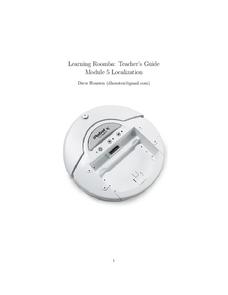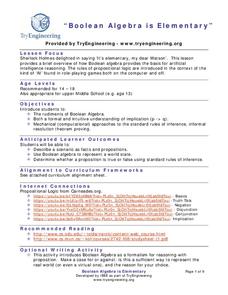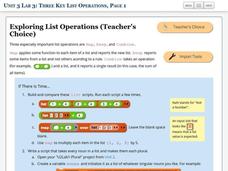Drexel University
Learning Roomba Module 1: Robotics Introduction
Introducing Mr. Robot. As an introduction to robotics, class develop a definition of a robot and make distinctions between real robots and those in science fiction. They also study the basics of programming in Java to program a Roomba.
Drexel University
Learning Roomba Module 5: Localization
Where is my robot? Pupils create programs that utilize the localization services that a Roomba uses to determine its surroundings.
Code.org
Minecraft Hour of Code
Devote an hour to computer coding ... it's time well spent! The activity has young computer scientists write code to solve puzzles in the Minecraft game. They learn how to apply block codes and repeat loops.
Davis School District
Computer Parts
What is inside a computer? Give your budding computer scientists a worksheet that has them label parts of a computer. They use a link included on the sheet to label basic input/output systems, video cards, drives, case fan, and more....
Khan Academy
Challenge: Flower Grower
How does the garden grow? With inherited functions! The interactive activity has individuals alter a program to utilize object inheritance. Scholars develop an object type that two other objects use to inherit similar aspects. The...
Beauty and Joy of Computing
Conditional Blocks
If you use the resource, then pupils will understand conditional block instructions. In the first lab of a six-part unit, pupils learn how to use conditional statements (if/then) in block instructions for computer programming. They apply...
TryEngineering
Program Your Own Game
Young computer scientists get to see what it's like to be a software engineer as they use free online software to design a computer game. They play and evaluate games groups created to round out the activity.
TryEngineering
Boolean Algebra is Elementary
See how Boolean algebra relates to video games with a lesson that teaches young scholars how to use Boolean algebra to create rules for a virtual world. They test the rule base for consistency in groups.
TryEngineering
Graphics: Bits and Points
What can a mural teach pupils about computer science? The activity has scholars create a mural on a wall to learn about bitmap and vector graphics. Along the way, they learn about the graphics coordinate system.
Beauty and Joy of Computing
Unsolvable and Undecidable Problems
Try as you might, some functions just cannot be computed. The lab introduces the class to the possibility of unsolvable problems. The fourth lesson in a series of seven begins with a logic problem, then progresses to looking at functions...
Beauty and Joy of Computing
Search Engines
Which search engine is best? The last lab in a unit of five leads the class to investigate search engines. Working in groups, individuals read and discuss articles related to searching the Internet. Pupils develop suggestions that would...
Beauty and Joy of Computing
Three Key List Operations
Develop an understanding of the Map, Keep, and Combine operations. The lab leads the class through the exploration of three list operations. Each task contains a self-check to measure scholars' understanding of the operation in the task.
Beauty and Joy of Computing
Nesting Lists
Create lists within lists. The second lab in a series of five in the unit has pupils develop a simple contact list app. The tasks within the lab build the need for an abstract data type. Individuals build more complexity into their...
Beauty and Joy of Computing
Algorithms
Introduces the class to the idea of searching a list by building a script. Learners modify a guessing game script that will find a number in a list.
Beauty and Joy of Computing
Combining List Operations
Use list operations to modify an earlier version of Tic Tac Toe. The fourth lab in a series of five has pupils combine list operations to build more powerful operations. They take a project from a previous unit and enhance it to keep...
TryEngineering
Search Engines
Introduce search engines with an activity that models how search engines work and the different algorithms they employ. Working in groups, class members then build search queries to demonstrate the knowledge learned.
Teach Engineering
Start Networking!
Class members create their own social networks by collecting signatures before graphing the interactions with their fellow classmates. The degree distribution of the simulated social network is determined by calculating the degree of...
Teach Engineering
Storing Android Accelerometer Data: App Design
There's an app for that! Pupils learn to build an app that will store data on an Android. The lesson plan introduces class members to the tiny database, TinyDB, for Android devices. A video tutorial provides an example that uses the...
Code.org
Practice PT - The Internet and Society
Speaking of the Internet. The culminating lesson for the unit on the Internet challenges pupils to prepare short, two-minute speeches on an issue facing society. The pupils chose from three topics that connect the Internet and society,...
Code.org
Practice PT - Design a Digital Scene
The final performance task for the unit requires class members to utilize what they have learned to create a personal digital scene. Groups work together to develop a scene and then, using top-down design, break the scene into manageable...
Code.org
Creating Functions with Parameters
The pupils practice modifying parameters in a function to add variations to their under the sea scene. The resource also introduces random number functions that alter the scene every time the program runs.
Code.org
Functions and Top-Down Design
Let me break it down for you! Introduce your class to a way of breaking up a complicated task into its component pieces. Individuals draw a complex figure using JavaScript and then break it down to help determine the functions needed in...
Code.org
The Need for Programming Languages
LEGO see if you can recreate my design. Individuals build an arrangement from LEGO blocks and write directions for someone else to follow in order to recreate the arrangement. Pairs then swap directions and try to replicate the original...
Code.org
Check Your Assumptions
Always check your assumptions when interpreting data and data visualizations. That's the take away from this exercise. Class members examine a failed project that looks at search trends to predict flu outbreaks and consider the...

























